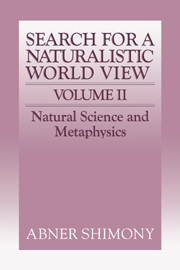Book contents
- Frontmatter
- Contents
- A MEASUREMENT IN QUANTUM MECHANICS
- 1 Role of the observer in quantum theory
- 2 Approximate measurement in quantum mechanics
- 3 Proposed neutron interferometer test of some nonlinear variants of wave mechanics
- 4 Desiderata for a modified quantum dynamics
- 5 Filters with infinitely many components
- 6 Proposed neutron interferometer observation of the sign change of a spinor due to 2π precession
- B QUANTUM ENTANGLEMENT AND NONLOCALITY
- C COMPLEX SYSTEMS
- D TIME
- E THE MENTAL AND THE PHYSICAL
- Index
4 - Desiderata for a modified quantum dynamics
Published online by Cambridge University Press: 05 June 2012
- Frontmatter
- Contents
- A MEASUREMENT IN QUANTUM MECHANICS
- 1 Role of the observer in quantum theory
- 2 Approximate measurement in quantum mechanics
- 3 Proposed neutron interferometer test of some nonlinear variants of wave mechanics
- 4 Desiderata for a modified quantum dynamics
- 5 Filters with infinitely many components
- 6 Proposed neutron interferometer observation of the sign change of a spinor due to 2π precession
- B QUANTUM ENTANGLEMENT AND NONLOCALITY
- C COMPLEX SYSTEMS
- D TIME
- E THE MENTAL AND THE PHYSICAL
- Index
Summary
THE MOTIVATION FOR MODIFYING QUANTUM DYNAMICS
A cluster of problems – the “quantum mechanical measurement problem,” the “problem of the reduction of the wave packet,” the “problem of the actualization of potentialities,” and the “Schrödinger cat problem” – is raised by standard quantum dynamics when certain assumptions are made about the interpretation of the quantum mechanical formalism. Investigators who are unwilling to abandon these assumptions will be motivated to propose modifications of the quantum formalism. Among these, many (including Professor Ghirardi and Professor Pearle) have felt that the most promising locus of modification is quantum dynamics, and they have suggested stochastic modifications of the standard deterministic and linear evolution of the quantum state (PSA 1990, A. Fine, M. Forbes, and L. Wessels (eds.), East Lansing, Michigan: Philosophy of Science Association, 1991). Others who have followed this avenue of investigation are F. Károlyházy, A. Frenkel, and B. Lukács (Károlyházy et al. 1982), N. Gisin (1984, 1989), A. Rimini and T. Weber (in Ghirardi et al. 1986), L. Diósi (1988, 1989), and J. S. Bell (1987, pp. 201–12). At a workshop at Amherst College in June 1990 Bell remarked that the stochastic modification of quantum dynamics is the most important new idea in the field of foundations of quantum mechanics during his professional lifetime. My own attitude is somewhat cautious and exploratory.
- Type
- Chapter
- Information
- The Search for a Naturalistic World View , pp. 55 - 67Publisher: Cambridge University PressPrint publication year: 1993
- 1
- Cited by



